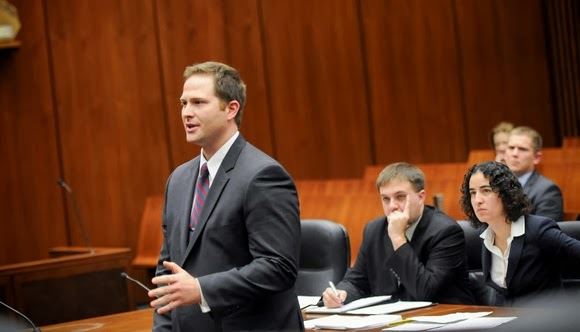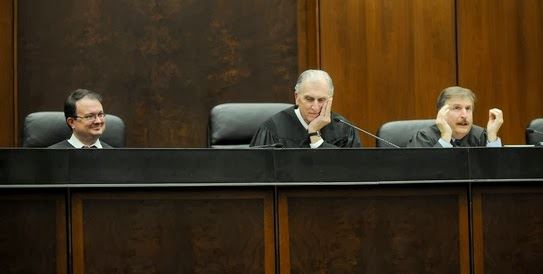Each year, the Association gathers during the first weekend in November to host its annual moot court competition. The competition furthers the ALA's tradition of fostering and encouraging the highest professional and ethical standards in appellate advocacy by providing law students an opportunity to write an appellate brief and to present oral arguments before distinguished reviewing court jurists and appellate practitioners.

A participant addresses the bench during the Association's annual moot court competition.
This year's competition kicked off on Friday, November 1st at the Dirksen federal building in Chicago. As in the past, the competition drew teams from Texas to New York, as well as from many local schools. During the preliminary rounds, participants presented oral arguments before ALA members, who served as judges. After the preliminary rounds, Sidley Austin LLP generously hosted a reception. Association President Brad Elward provided welcoming remarks while ALA members and participants mingled over cocktails and hor d'oeuvres. Thereafter, the moot court committee announced the teams advancing to the semi final round.
The competition continued the next day, in which Florida Coastal School of Law bested Benjamin N. Cardozo in the final round. Justice William E. Holdridge of the Illinois Appellate Court, Third District, presided over the final bench. Justice Donald Hudson of the Illinois Appellate Court, Second District, and Illinois Solicitor General and ALA Secretary Michael Scodro joined Justice Holdridge.

Justice William E. Holdridge presiding over the final argument.
The problem asked the participants to argue, from both the appellant's and appellee's perspective, a complex problem involving the federal Computer Fraud and Abuse Act. Specifically, the issue involved whether an employee acted “without authorization” when he accessed confidential and proprietary business information from his employer’s computer that he had permission to access, but then used that information in a manner inconsistent with the employer’s interests, and where the employee intended to use the information in that manner at the time of access. Participants also argued whether the electronic discovery costs were recoverable by the prevailing party under Rule 54(d)(1) of the Federal Rules of Civil Procedure, when those costs included electronic data storage, extracting metadata, hard-drive imaging, file conversion, and other e-discovery.
The ALA congratulates all students who participated in the program; and thanks the Appellate Court justices and ALA members who served as judges, the competition's sponsors, and the moot court committee for another successful competition.
.png)